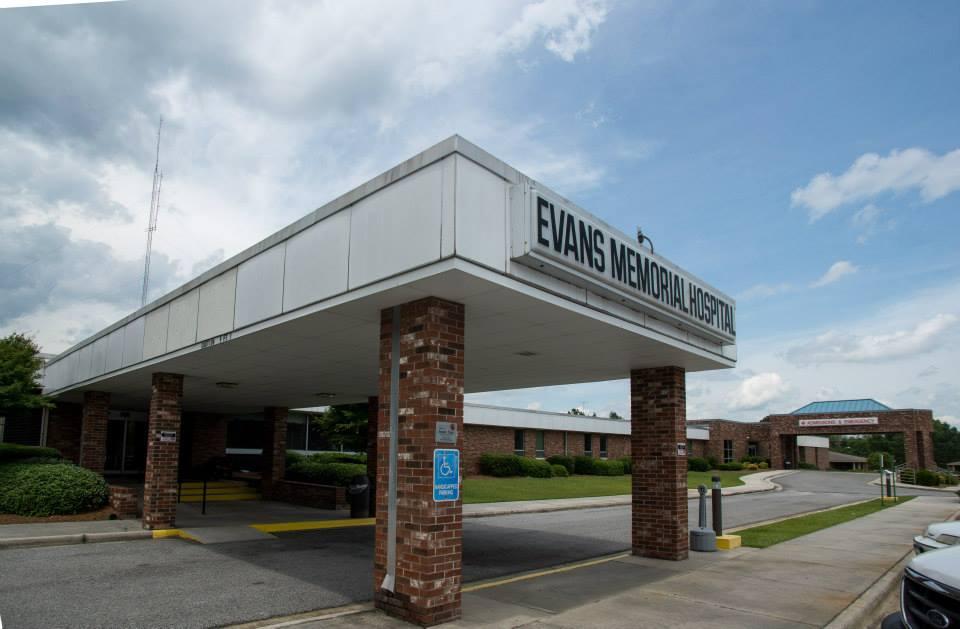
Despite gross cutbacks and financial restraints, Evans Memorial Hospital in Claxton is in trouble. The Evans Memorial Hospital Board of Directors has notified the Hospital Authority of Evans County that it can no longer continue to operate Evans Memorial Hospital.
A letter signed by Evans Memorial Hospital Board member Patsy Rogers and Evans County Hospital Authority Chair Jesse Scott dated February 6th prompted an emergency meeting by county commissioners on Friday, February 7th.
The letter cites decreasing reimbursement, increased costs, and an increase in indigent care and bad debt. In FY 2019, EMH had $3,618,178 in uninsured and patient write-offs and $541,405 in indigent care. The total charges for the same year totaled $51,267,263 while revenue collected was only $10,264,987 – 0r 20% of charges. Additionally, FY 20 projects revenue collection of only 18% of charges.
Of concern in the short term, the Hospital Authority notified the EMH Board of Directors that no longer operating the hospital would be a breach of a 1996 lease agreement. If EMH does not rectify the situation, the contract will be terminated and the Evans County Hospital Authority will become responsible for the operations of the hospital.
The hospital is asking Commissioners to:
- Immediately release the SPLOST funding owed to Evans County Memorial Hospital.
- $1 million in subsidies in FY 2020 in addition to the SPLOST money
- An increase of 4 mills, or the equivalent of $1 million going forward – in addition to the 2 mills already designated on property tax bills for the bond payment.
- The restructuring of bonds under Evans County removing the debt from the Hospital Authority (this is due in part to the county having a better bond rating)
EMH says subsidies provided in the short term would pay employee benefits – like health insurance premiums – as well as critical vendors. Future subsidies would offset charity care and bad debt write-offs.
In June 2018, the hospital requested an additional loan from Commissioners, which was approved. The problem then was how quickly accounts payable continued to accrue, especially with lacking and mediocre Medicaid reimbursements and patients who never satisfy their financial obligations owed to the hospital. Much of it was and continues to be outside the control of the hospital itself.
County Administrator Casey Burkhalter says the county has been working on ways to work on refinancing the bonds to reduce the interest payments owed back, but that cannot be done overnight.
It is estimated that closing the hospital would cost $2.5 million to $3.8 million to cover things such as unemployment, lease payments on property, outstanding accounts payable, and other line items.
Of the 26 states that have seen at least one rural hospital close since 2010, those with the most closures are located in the South, according to research from the North Carolina Rural Health Research Program. Nationwide, 83 rural hospitals across the country have shuttered their doors since 2010, six of those being in the Peach State. The shuttering of a hospital in a rural community has proven to be grossly detrimental to the overall well being of the community.
The Rural Healthcare Tax Credit & Evans County
In 2016, Georgia passed the rural hospital tax credit, which allows Georgia taxpayers and C-Corporations that donate funds through the Georgia HEART Hospital Program to those rural hospital systems that qualify and receive a 100% tax credit. Each hospital is eligible for up to $4 million in credits, meaning Evans Memorial could receive $4 million worth of donations from people and businesses in the community before donors would no longer be eligible to receive the tax credit. (All on the condition that donors apply for the credit before the $60 million cap is reached each year).
Example: On July 1, 2018 and provided the relevant caps have not been reached, any individual donor that made or makes a donation from January 1, 2018 until June 30, 2018 will be allowed 100% of the donation that was used to arrive at the amount of credit allowed during that period (up to $11,111 for a married filing joint taxpayer and $5,556 for all other individual taxpayers). After June 30 of each year, there will not be maximum credit limits on non-corporate contributions to rural hospitals in the event that the $60 million annual cap on credits is not met.
In December 2017, the Department of Community Health ranked Evans Memorial No. 14 in “financial need” for the rural healthcare tax credit program, in line behind 13 others, mostly south of Macon.
Letter from EMH/Hospital AuthorityJessica Szilagyi is a former Statewide Contributor for AllOnGeorgia.com.

2 Comments
Leave a Reply
Cancel reply
Leave a Reply

Chattooga Opinions
Medically Supervised Weight Loss: Inside Premier Weight Loss & Medispa

Chattooga Local News
Georgia Power Files Plan for Customer Rate Decrease with Public Service Commission

Chattooga Local Government
Carr Pushes for Permanent Halt of Medicare and Medicaid Funding for Child Sex-Change Procedures

Bulloch Public Safety
02/20/2026 Booking Report for Bulloch County

Bulloch Public Safety
01/26/2026 Booking Report for Bulloch County

Bulloch Public Safety
02/09/2026 Booking Report for Bulloch County

Bulloch Public Safety
02/16/2026 Booking Report for Bulloch County

Bulloch Public Safety
02/02/2026 Booking Report for Bulloch County

Bulloch Public Safety
01/30/2026 Booking Report for Bulloch County








Cb waters
February 10, 2020 at 6:12 pm
Why is that every time money is needed , property owners has to pay the bill . We don’t own anything we have now.
I hate to lose the hospital but if I get in trouble financially, no on raises the mills for me . If I ran my home like the hospital , I would lose. Might as well let dying dog die. Tax payers has enough taxes hanging around their neck now, especially senior , we should not have to be paying anything but sales tax . Many of you might not agree with me but , it’s just the way ay I feel. People in this country has lost their homes because they couldn’t pay taxes , did anyone raise taxes to help them? Get real folks, you are losing a battle when that kind of money is involved. Year after year in loses should wake someone up. If I hurt you feelings, sorry. The people has paid and paid , now its time to stop. Could you run your business or household that way . No!!
R. Smith
February 11, 2020 at 4:53 am
Has anyone even thought that maybe patients who have been to Evans memorial for medical care end up not being able to pay their bill because of the simple fact that the medical care they receive from there is either inaccurate or incomplete, so the patient then has to go to another hospital to receive the care that they actually need. Then they are stuck with 2 bills from 2 different medical facilities. I don’t know about everyone else but I would pay the bill to the facility that actually helped me get better by diagnosing and treating my illness appropriately. I myself have been there and been misdiagnosed and given medication for one thing only to feel worse after days of taking the medication prescribed to me. So I went to a different facility where the doctor actually took time to use the technology available to him to give me a correct diagnosis and treatment plan, and within 2 days I was feeling better. It seems like the staff at EMH spends as little time as possible when seeing patients, especially in the emergency department. I have medical insurance so I do not rely on indigent care, but if I go in there they do not order any testing of any sort not a even a blood count or a urinalysis. I have completely stopped going there for care for myself as well as for my family because it’s simply a waste of time. It’s just better to drive to Riedsville, Vidalia, Metter, or Statesboro.